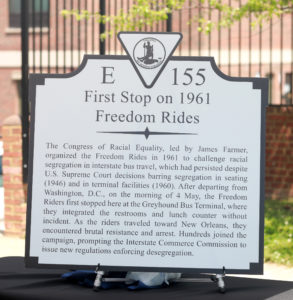
Sixty years ago today, 13 men and women – seven Black and six white – departed Washington, D.C., on Greyhound and Trailways buses. Led by civil rights icon James L. Farmer Jr., these Freedom Riders embarked on a quest to desegregate interstate travel.
Their first stop? Fredericksburg, Virginia. The riders visited the bus station terminal and lunch counter, once located at the corner of Princess Anne and Wolfe streets, where the fire station stands today.
The bus depot was torn down years ago, but this afternoon, a historical marker was erected in its place, thanks to the tireless work of University of Mary Washington staff, faculty and students, in partnership with the City of Fredericksburg. Their efforts are part of a greater campaign to share the history of the region’s Black residents, as well as UMW’s commitment to keep alive the legacy of the Freedom Riders and Dr. Farmer.
A distinguished professor of history, Farmer often regaled Mary Washington students with his first-hand accounts of the civil rights era in his booming baritone. Since his death in 1999, UMW and the James Farmer Multicultural Center (JFMC) have taken up the mantle by educating students and area residents through programming and academic courses focused on this significant moment in American history.
“We want future generations of UMW students to know they are capable of doing the same work as the Freedom Riders, many of whom were also college aged,” said JFMC Assistant Director Chris Williams.
A former James Farmer Scholar and personal friend of Farmer, Williams spearheaded the marker project to honor those who risked their lives by boarding those buses, enduring violence and imprisonment in their fight for justice and equality.
In the last decade, UMW has invited many of those men and women to campus, like Bernard Lafayette Jr., Joan Trumpauer Mulholland and the late Congressman John Lewis, who gave the address at Mary Washington’s 2011 commencement the same week as the 50th anniversary of the Freedom Rides.
UMW recognized that milestone with a months-long commemoration, which included a “Great Lives” lecture with Freedom Rides biographer Raymond Arsenault and a screening of the PBS documentary, The Freedom Riders. The University also displayed a photography exhibit with a 1960s-era bus as a backdrop.
In addition, Charles Reed ’11, now a member of UMW’s Board of Visitors and the Farmer Legacy Council celebrating Farmer’s centennial birthday was chosen – along with several dozen college students nationwide – to retrace the Freedom Riders’ journey through the Deep South on the PBS American Experience bus. He had the opportunity to travel with several of the original riders.
A decade later, Reed remembers singing civil rights anthems like Buses Are a Comin’ with his fellow riders. “I wanted to visit the landmarks that influenced my heritage and to hear about that turbulent time in history from those who experienced it.”
In 2019, JFMC organized a trip for Mary Washington students and local residents to follow the same route. At the Anniston, Alabama, stop where a white mob brutally beat the riders and firebombed the bus, the group searched for a highway marker, only to discover it was nowhere near the site of the attack.
It got Williams thinking about his own hometown. He approached several UMW colleagues – including Professors Erin Devlin, Christine Henry and Stephen Hanna – about securing a highway marker for the old bus station. Vice Mayor Chuck Frye and Victoria Matthews, the city’s tourism sales manager, also got on board. So did retired teacher Mayo Carter, who volunteered to pay for the marker.
With the help of Mary Washington students, the group pored over archives at the UMW and Central Rappahannock Regional libraries, and the nearby Shiloh Old Site Baptist Church, to help tell the Freedom Riders’ story.
In March of this year, the UMW group was notified that the Virginia Department of Historic Resources had approved their application. Today, a temporary marker was unveiled in front of a small gathering; the permanent one will be installed this fall. And Mayor Mary Katherine Greenlaw proclaimed May 4 as “Freedom Riders Day.” Virginia Delegate Joshua Cole also presented Williams with House Resolution 601, commending his work with the JFMC to keep Farmer’s legacy alive.

“It’s a tremendous honor, as Dr. Farmer was my mentor and friend,” Williams said. But this is only the third marker on the Virginia civil rights trail, he said, so he’s working with the city to identify other sites.
“We need to ensure that Black history is properly documented,” he said, “and that these stories are being told.”
This evening at 6 p.m., JFMC will hold a virtual screening of PBS’s “The Freedom Riders” documentary, with a discussion to follow. Learn more on the Center’s site.
A fundraising campaign currently is underway to raise $100,000 in new funds to enhance programming in UMW’s James Farmer Multicultural Center. Learn more at https://students.umw.edu/multicultural/.










